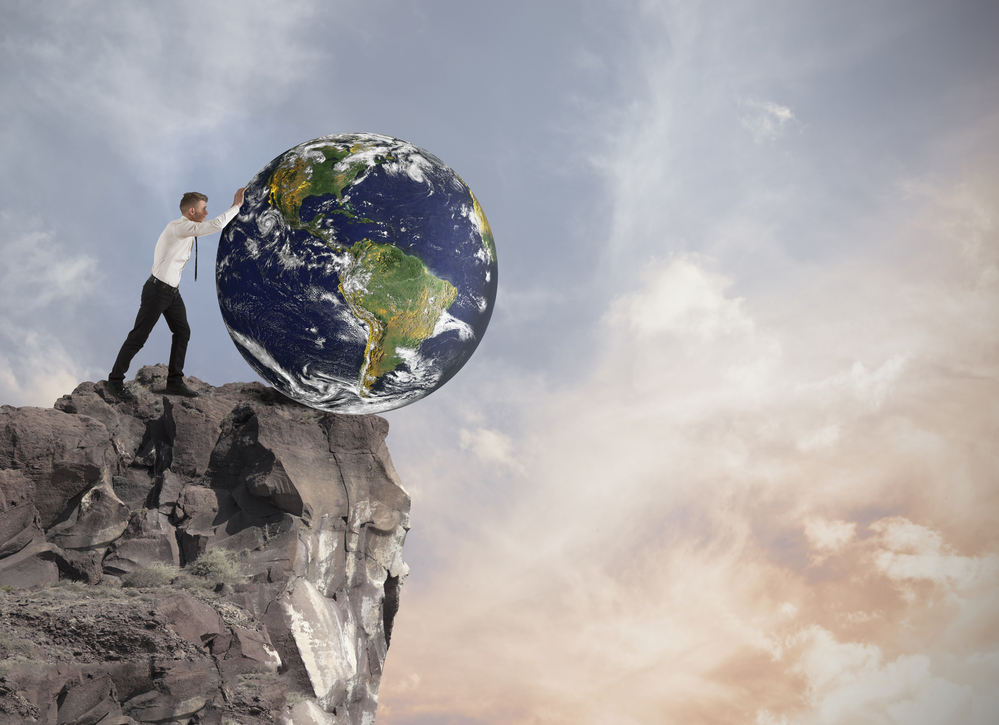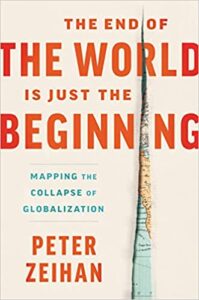Economic Thought Experiments
By Arnold Kling


- Perhaps the oddest thing of our soon-to-be present is that while the Americans revel in their petty, internal squabbles, they will barely notice that elsewhere !!! Lights will flicker and go dark. Famine’s leathery claws will dig deep and hold tight. Access to the inputs—financial and material and labor—that define the modern world will cease existing in sufficient quantity to make modernity possible… the last seventy-five years will be remembered as a golden age, and one that didn’t last nearly long enough at that.
- Peter Zeihan, The End of the World Is Just the Beginning: Mapping the Collapse of Globalization. (6)1
Students of economics could benefit greatly by reading through this thought-experiment. Basic economic concepts like opportunity cost and the gains from trade are rarely made concrete. Instead, they are usually taught using simple paper exercises. In contrast, The End describes economic activity as it actually takes place, in all its modern complexity.
With less than ten percent of Americans working as factory production workers or agricultural laborers, the rest of us have little appreciation of how our basic needs get met. This was brought home to me during the early weeks of the pandemic, when friends who are members of the laptop class complained about the fact that other people were out and about rather than staying home. I had to remind them that the people they were deriding as stupid and heedless of public health were making it possible for the rest of us to eat.
Zeihan focuses on the basics: demographics, transportation, energy, industrial materials, manufacturing, and food production. He explains how these factors operated in pre-industrial societies, during the industrial revolution, and in the “golden age” of the last 75 years. And he describes what could happen if (when?) the foundation for prosperity erodes. He is pessimistic that world trade routes will remain peaceful and that countries will be able to adapt to rapidly declining birth rates. Economically, this will produce a vicious cycle.
- … reduced interaction means reduced access means reduced income means fewer economies of scale means less labor specialization means reduced interaction… Everyone becomes less efficient. Less productive. And that means less of everything: not just electronics but electricity, not just automobiles but gasoline, not just fertilizer but food… Electricity shortages gut manufacturing. Food shortages gut the population. Fewer people means less chance of keeping anything that requires specialized labor working. Say, things like road construction or the electrical grid or food production.
- That is what “decivilization” means: a cascade of reinforcing breakdowns that do not simply damage, but destroy, the bedrock of what makes the modern world function. (66)
Global transportation costs have come down in recent years. Some of this comes from inventions, such as the container ship. Some of it comes from low energy costs, as we have discovered more oil and more ways to extract oil. And much of it comes from America’s perceived need to protect the non-Communist world and ensure freedom of the seas.
Zeihan sees the fall of Communism as reducing America’s motivation to be the world’s policeman. With no policeman, he predicts trade will be more often disrupted by war and piracy. Violence will impose a large tax on transportation.
- Anything that raises the marginal cost of transport increases friction throughout the system. Simply a 1 percent increase in the cost of a subsidiary part largely obliterates the economics of an existing supply chain. Most locations will count themselves fortunate if their transport costs increase by only one hundred percent (387)
In his book, Zeihan dives into the specifics of how the world produces and trades food, energy, and manufactured goods. He clearly explains the feedback loops involved.
Perhaps the most interesting chapters concern energy. Although Zeihan is a believer in the dangers of climate change, his analysis shows that “green energy” fails, even on its own terms. In order to generate, transmit, and store solar and wind power, we need to build solar panels, wind farms, batteries, and new transmission systems. The cost of doing so, including the carbon dioxide that will be released in that atmosphere in the process, is daunting.
Zeihan starts with the limited availability of reliable solar and wind power.
- Zones for which today’s greentech makes both environmental and economic sense comprise less than one-fifth of the land area of the populated continents, most of which is far removed from our major population centers. Think Patagonia for wind, or the Outback for solar. The unfortunate fact is that greentech in its current form simply isn’t useful for most people in most places—either to reduce carbon emissions or to provide a substitute for energy inputs. (265)
Zeihan notes the energy density of fossil fuels.
- Fossil fuels are so concentrated that they are literally “energy” in physical form. In contrast, all greentechs require space. Solar is the worst of the bunch: it is roughly one thousand times less dense than systems powered by conventional means…
- … All [cities] are by definition densely populated, while greentech by definition is not dense. Squaring that circle even in sunny and windy locations will require massive infrastructure to bridge the gap between dense population patterns and far more dispersed greentech electricity-generating systems. Such infrastructure would be on a scale and of a scope that humanity has not yet attempted. The alternative is to empty the cities and unwind six thousand years of history. (268)
For more on these topics, see
- Opportunity Cost, by David R. Henderson. Concise Encyclopedia of Economics.
- “Free Trade and Globalization: More than ‘Just Stuff’,” by Donald J. Boudreaux. Econlib, Nov. 1, 2010.
- “Order and the Wealth of Nations,” by Arnold Kling. Econlib, May 4, 2020.
I hope that people read and come away with a better appreciation of what makes our modern world possible. We are highly specialized. We are very interdependent. Our energy production and distribution system is remarkably efficient. Those who would like to stifle global trade and/or fossil fuels should understand just how primitive we might live if their ideologies prevail.
Footnotes
[1] The End of the World Is Just the Beginning: Mapping the Collapse of Globalization, by Peter Zeihan
*Arnold Kling has a Ph.D. in economics from the Massachusetts Institute of Technology. He is the author of several books, including Crisis of Abundance: Rethinking How We Pay for Health Care; Invisible Wealth: The Hidden Story of How Markets Work; Unchecked and Unbalanced: How the Discrepancy Between Knowledge and Power Caused the Financial Crisis and Threatens Democracy; and Specialization and Trade: A Re-introduction to Economics. He contributed to EconLog from January 2003 through August 2012.
Read more of what Arnold Kling’s been reading. For more book reviews and articles by Arnold Kling, see the Archive.
